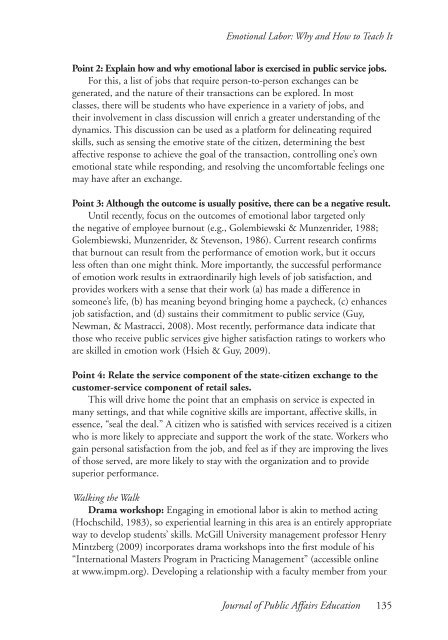JOURNAL OF PUBLIC AFFAIRS EDUCATION - Naspaa
JOURNAL OF PUBLIC AFFAIRS EDUCATION - Naspaa
JOURNAL OF PUBLIC AFFAIRS EDUCATION - Naspaa
You also want an ePaper? Increase the reach of your titles
YUMPU automatically turns print PDFs into web optimized ePapers that Google loves.
Emotional Labor: Why and How to Teach ItPoint 2: Explain how and why emotional labor is exercised in public service jobs.For this, a list of jobs that require person-to-person exchanges can begenerated, and the nature of their transactions can be explored. In mostclasses, there will be students who have experience in a variety of jobs, andtheir involvement in class discussion will enrich a greater understanding of thedynamics. This discussion can be used as a platform for delineating requiredskills, such as sensing the emotive state of the citizen, determining the bestaffective response to achieve the goal of the transaction, controlling one’s ownemotional state while responding, and resolving the uncomfortable feelings onemay have after an exchange.Point 3: Although the outcome is usually positive, there can be a negative result.Until recently, focus on the outcomes of emotional labor targeted onlythe negative of employee burnout (e.g., Golembiewski & Munzenrider, 1988;Golembiewski, Munzenrider, & Stevenson, 1986). Current research confirmsthat burnout can result from the performance of emotion work, but it occursless often than one might think. More importantly, the successful performanceof emotion work results in extraordinarily high levels of job satisfaction, andprovides workers with a sense that their work (a) has made a difference insomeone’s life, (b) has meaning beyond bringing home a paycheck, (c) enhancesjob satisfaction, and (d) sustains their commitment to public service (Guy,Newman, & Mastracci, 2008). Most recently, performance data indicate thatthose who receive public services give higher satisfaction ratings to workers whoare skilled in emotion work (Hsieh & Guy, 2009).Point 4: Relate the service component of the state-citizen exchange to thecustomer-service component of retail sales.This will drive home the point that an emphasis on service is expected inmany settings, and that while cognitive skills are important, affective skills, inessence, “seal the deal.” A citizen who is satisfied with services received is a citizenwho is more likely to appreciate and support the work of the state. Workers whogain personal satisfaction from the job, and feel as if they are improving the livesof those served, are more likely to stay with the organization and to providesuperior performance.Walking the WalkDrama workshop: Engaging in emotional labor is akin to method acting(Hochschild, 1983), so experiential learning in this area is an entirely appropriateway to develop students’ skills. McGill University management professor HenryMintzberg (2009) incorporates drama workshops into the first module of his“International Masters Program in Practicing Management” (accessible onlineat www.impm.org). Developing a relationship with a faculty member from yourJournal of Public Affairs Education 135
















